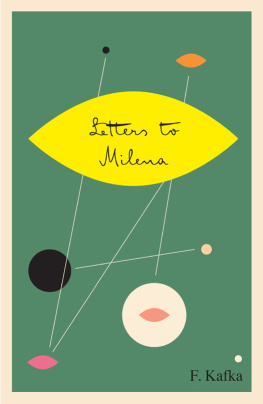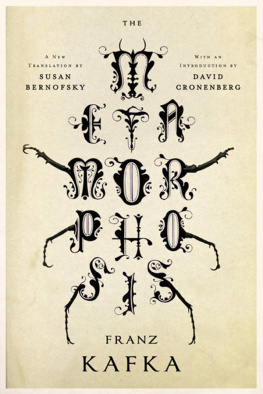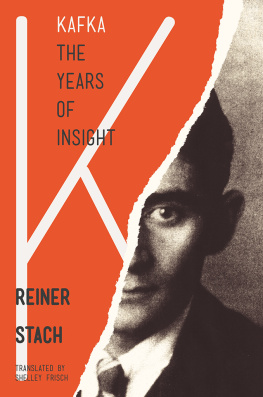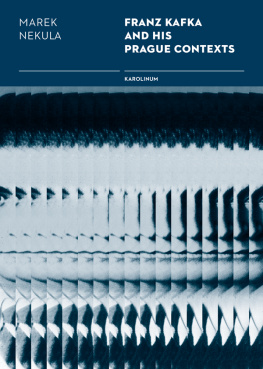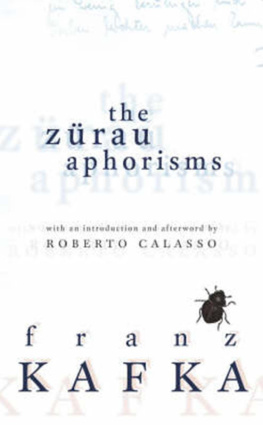The Aphorisms of Franz Kafka
The Aphorisms of Franz Kafka
Edited, introduced, and with commentaries by
Reiner Stach
Translated by
Shelley Frisch
PRINCETON UNIVERSITY PRESS
PRINCETON AND OXFORD
First published in Germany by Wallstein Verlag under the title Du bist die Aufgabe: Aphorismen, copyright Wallstein Verlag, Gttingen, 2019
English translation copyright 2022 by Princeton University Press
Princeton University Press is committed to the protection of copyright and the intellectual property our authors entrust to us. Copyright promotes the progress and integrity of knowledge. Thank you for supporting free speech and the global exchange of ideas by purchasing an authorized edition of this book. If you wish to reproduce or distribute any part of it in any form, please obtain permission.
Requests for permission to reproduce material from this work should be sent to
Published by Princeton University Press
41 William Street, Princeton, New Jersey 08540
99 Banbury Road, Oxford OX2 6JX
press.princeton.edu
All Rights Reserved
ISBN 978-0-691-20592-2
ISBN (e-book) 978-0-691-23639-1
British Library Cataloging-in-Publication Data is available
Editorial: Anne Savarese and James Collier
Production Editorial: Jill Harris
Jacket and Text Design: Chris Ferrante
Production: Erin Suydam
Publicity: Alyssa Sanford and Carmen Jimenez
Copyeditor: Molan Goldstein
Version 1.0
Figure credits: () The Bodleian Libraries, University of Oxford, MS. Kafka 26, fol. 3v.
Jacket image: Weerachai Khamfu / Shutterstock
Contents
- VII
- IX
Translators Note
After translating Reiner Stachs magnificent three-volume Kafka biographypublished by Princeton University PressI have now had the pleasure of returning to Franz Kafka, to Reiner Stach, and to the Press to work on this new annotated edition of Kafkas aphorisms. Translating this slim but seminal volume has deepened my understanding of all of Kafkas writings, even after the extremely deep dive I did for the biography.
The Aphorisms of Franz Kafka is not the first translation into English of Kafkas Zrau aphorisms, but this new edition differs from all older ones in two notable respects. First and foremost, Reiner Stachs meticulous and astute interpretive guidance, which follows the translation of each aphorism, situates the individual aphorisms within the larger context of Kafkas writings and in doing so sheds light on both the elusive aphorisms themselves and the entirety of Kafkas oeuvre. My challenge here was to pick up on the nexus of interconnections that Reiner Stach laid out in his commentaries and take a fresh approach to the translations of the aphorisms with these interconnections in mind. The German word Weg, for example, traces a path throughout the aphorisms and is a significant connecting thread, which unspools when the wordwhich can mean way, route, road, et ceterais rendered in a variety of ways, as it has been in previous translations. My translation, which uses path throughout, underscores the linkages between the aphorisms. As Andrew Hui points out in A Theory of the Aphorism: From Confucius to Twitter, aphoristic writing can become a recursive exercise of saying the same thing in many different ways. Its concision invites repetitions and modulations. But this repetition is never sterile it functions as an intensification of the problems at hand, affording discovery and experimentation.
We learn from Stachs commentary that Einpfhlen, in Aphorism 2, is a word that Kafka presumably knew from horticulture, and refers to the use of posts to prop up and stabilize young fruit trees with (usually three) posts or to the use of fence posts to enclose a pasture. Kafka had ample opportunity to observe this work in Zrau. Hence, it is more specific in its origins and imagery than the pinning down one might find in other renderings of this aphorism. Stachs details about the dating and updating of the aphorisms clue us in to the evolution of Kafkas thought and what he was reacting to at the time of their composition. An aphorism such as number 93 (Psychology, for the last time!)which scarcely fits the category of aphorism at allcries out for context, and here, again, the annotations connect this potentially baffling outburst to Kafkas readings at the time, his correspondence, and his overall outlook on psychology. And by learning the details of Kafkas revisions, we gain deeper insight into Kafkas conceptual grapplings, such his choice of invalid (nichtig) after trying out and rejecting incorrect, then false, for Aphorism 6.
A second feature of this new edition is its inclusion of Kafkas original German for each of the aphorisms, thus furnishing readers who know German with still more interpretive tools. Kafkas aphorisms can be so cryptic that the discerning reader stands to benefit from every possible route of entry to them. In this bilingual edition, word usages and repetitions can be tracked in both languages. The inclusion of the original German wording serves to highlight where Kafka was tugging at the borders of proper German (Alle menschlichen Fehler sind Ungeduld: All human errors are impatience) and has allowed my translations of the aphorisms to adhere more closely to Kafkas wording without seeming offor more off, at any ratethan they appeared in German.
We have come a long way from Max Brods original packaging of the aphorisms under the title Reflections on Sin, Suffering, Hope, and the True Way, which nudged Kafkas words in the theological direction Brod hoped to take them. We can now grasp anew the meaning of these enigmatic aphorismswhich many readers of Kafka consider the core, and jewel, of his oeuvre as a wholewhile enhancing our understanding of Kafkas letters, diaries, short prose, and novels. I hope and trust that readers of this richly annotated volume will enjoy poring over it as much as I have enjoyed translating Franz Kafkas aphorisms and Reiner Stachs eye-opening commentaries.
Shelley Frisch
Princeton, New Jersey
June 2021
Andrew Hui, A Theory of the Aphorism: From Confucius to Twitter (Princeton University Press, 2020), 20. Hui also notes the experience readers have come to associate with reading aphoristic writings, The irony is that the aphorismthis shortest of forms to readactually takes the longest time to understand (p. 6).
Foreword
Kafkas aphorisms are among the most original intellectual creations of the twentieth century, yet no aim is more alien to them than to drive home a point, produce an unprecedented effect, or astound an imagined readership. Exaggeration for the sake of effectwhich we might think inherent in the literary genre of the aphorismis barely in evidence here; even where well-versed readers expect it, where they savor their anticipation of it, Kafka almost always sacrifices aesthetic effect in favor of a maximal linguistic and visual compactness, right to the edge of comprehensibility and sometimes even a step beyond, which makes these texts forbidding, inscrutable. They show nothing, demonstrate nothing, move along their trajectory as they follow the path of an idea. And even the occasional you is not directed at us; it is the monological you that emerges from a state of deep concentration.
Some readers of Kafka have been mightily disappointed. Having learned to navigate, and derive aesthetic pleasure from, the world of The Metamorphosis and The Trial, which is marked in equal measure by nightmarish logic and humor, they can find their expectations dashed here; apart from a few incomparably memorable images and paradoxes, they will have trouble recognizing




